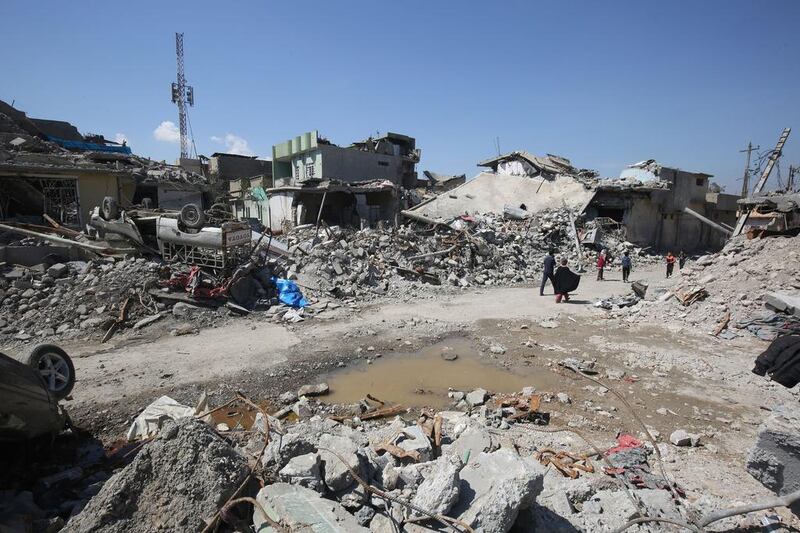HAMMAN AL ALIL, IRAQ // Umm Mustapha and her family endured 12 days of intense coalition bombing before ISIL was finally driven out of west Mosul’s Al Jadida district, where the high civilian death toll has prompted an Iraqi investigation.
“It was like the apocalypse. The air strikes were very powerful, and the earth would shake when the bombs exploded,” said Umm Mustapha, sitting on the floor of a tent in a displacement camp in the nearby town of Hamman Al Alil.
The terrified family of nine huddled under a staircase as bombs rained down on the west Mosul neighbourhood. When the bombardment ended last week, much of the district was reduced to rubble, she said.
“There was no life inside. The smell of death was everywhere.”
Then the militants began to rain mortar rounds on the area, forcing Umm Mustapha’s family to to flee.
Civilians are increasingly bearing the brunt as fighting intensifies for the remaining areas of west Mosul still held by ISIL.
Iraqi authorities said on Sunday they were investigating the high rate of civilian casualties in Mosul Al Jadida, with estimates of the dead ranging from dozens to hundreds. In particular, a strike the US-led coalition has confirmed carrying out on March 17 is claimed to have killed as many as 150 civilians when two bombs destroyed several houses packed with families.
“The defence ministry opened an investigation into this issue,” said Brig Gen Yahya Rasool, spokesman for Iraq’s joint operations command overseeing the battle against ISIL.
But he also accused ISIL of gathering civilians together and then blowing up explosives-rigged vehicles nearby to make it look like “Iraqi forces ... are targeting innocent civilians”.
Iraq’s elite counterterrorism troops discovered the terrible cost of their victory when they finally took Mosul Al Jadida on March 21. Amid an international outcry over the civilian toll, the Iraqi military on Saturday announced a temporary halt to the offensive in west Mosul.
On Sunday, it began deploying snipers to target militants using civilians as human shields, Brig Gen Rasool said. Iraqi forces were relying on “light and medium weapons, among them sniper [rifles], to hunt for Daesh members” located among civilians, he said.
With their numbers depleted by three months of fighting to liberate eastern Mosul from ISIL, the Iraqi Special Operations Forces (Isof) that took Mosul Al Jadida frequently call on coalition air support in the west of the city. The federal police and their elite units also rely on air cover to fend off suicide car bombers and make headway against strong resistance from the extremists.
ISIL prevents civilians from leaving neighbourhoods under their control, and shoots those who try to escape across front lines in contested areas. As the insurgents are pushed back, so are the trapped families, hemming an increasing number of people into a shrinking area.
Iraqi authorities say more than 200,000 people have left west Mosul since the operation to retake it began on February 19. But according to the United Nations, around 600,000 remain.
Residents who have escaped say they cowered in basements or were locked away as the militants fought Iraqi forces from their homes.
“Daesh stayed in our house for one week until they retreated. We were really scared that the coalition would bomb us. We were locked into the bathroom for three days, with nothing to eat,” said Rahma, 21, who fled the Mansour neighbourhood after it was liberated.
Often the number of people in a building is swelled by families displaced by fighting in other areas. Rahma’s family of 12 had taken in 23 relatives from the Wadi Hajjar area on the outskirts of west Mosul.
Such crowding increases the death toll when air strikes or artillery hit residential areas. Rahma said about 20 people died when bombs struck the homes of two neighbouring families in Mansour, one of whom had taken in a family from Wadi Hajjar.
The insurgents knock holes in walls separating houses, and force residents to keep their doors open, allowing them to shift positions quickly and without detection. It also enables a small number of insurgents to open fire at Iraqi forces from a number of different positions, putting more families at risk.
Ghazali, 40, and her family had a lucky escape when they hid in their home during fighting for Wadi Hajjar, as three ISIL fighters defending their block moved from building to building before retreating. When Isof moved in, an officer came to their house.
“He showed us a map and told us that our house had been a target, but that Daesh had retreated before they (the coalition) dropped a bomb on it,” said Ghazali, who has also fled to the camp at Hamman Al Alil.
Suicide car bombs, ISIL’s most potent weapon, are another lethal threat to civilians, and can tear huge holes in Iraqi lines if they are not stopped. But the blasts from car bombs destroyed by air strikes cause havoc in residential areas. Ghazali said 25 people died when an explosive-laden lorry was hit and detonated just 200 metres from her home in Wadi Hajjar.
According to Umm Mustapha, the ISIL fighters take delight in the death and destruction engulfing the population.
“One day I heard a Lebanese fighter shouting in the streets ‘I will not leave Mosul Al Jadida until it is reduced to rubble’,” she said.
Most residents of west Mosul interviewed by The National blamed ISIL for the deaths caused by coalition air strikes.
Ghazali chose to be more fatalistic.
“I don’t know whom to blame. It was their destiny to die in this war,” she said.
foreign.desk@thenational.ae
* With additional reporting from Agence France-Presse





